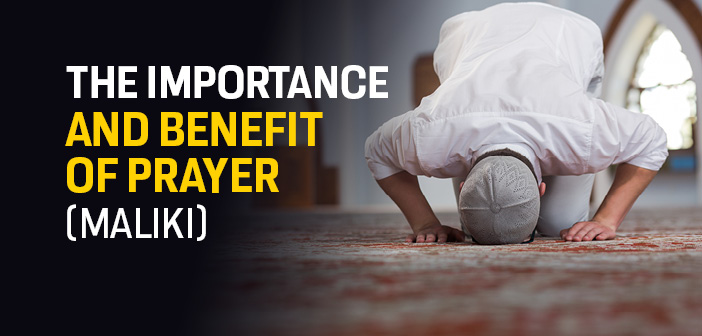What is the importance prayer? What is the benefit of prayer?
I. Why is it important and what happens when it is neglected
Fulfilling the prayers leads to Paradise and neglecting them may lead to the Hellfire. The Prophet (p.b.u.h) has said:
“Allah enjoined the five daily prayers on His servants. Allah assures those who faithfully do these prayers of paradise on the Day of Judgment. Yet, Allah does not assure those who do these prayers lightly, without care and have defects in the manner of its performance; Allah deals with them as He wishes, either punishes them, or forgives them.”[1]
And in another hadith, it has been said: “Whoever neglects prayer on purpose; Allah and the Messenger of Allah’s protection will be lifted from him.”[2]
Allah talks about the punishment for those who do not fulfil the prescibed prayer:
“Except the companions of the right. Who will be in gardens, questioning each other, about the criminals, [and asking them] “what led you into the hellfire?” They will say “We were not of those who prayed..” (Muddathir 39-43)
Abu Hurayra (r.a) narrates the following from the Prophet (p.b.u.h): “The first thing the people will be accountable for on the Day of Judgment is prayer, Allah will say to His angels: “Look at my servants (Fard) prayers. Were they complete or not?” If they were complete It will be written as complete. If they were not fully complete Allah will say: “See if my servant has voluntary (sunnah) prayers, If he has them Allah will say: Complete his obligatory prayers’ shortage with his voluntary prayers.” Then the rest of his deeds will be dealt with in the same manner.” [3]
A believer aims to fulfil his prayers at the proper time, and does not neglect them. Allah says in the Qur’an “And seek help through patience and prayer, and indeed, it is difficult except for the humbly submissive [to Allah ].” (Baqara 45)
Neglecting prayer due to worldly affairs is not excusable by Allah. Every responsible Muslim must perform every prayer at its time. Even at times of war, Allah has given permission to shorten the prayer, however not miss it. For women, other than the menses and post-natal bleeding period, they are also responsible for fulfilling the five daily prayers at the prescribed times.
Prayer should be performed with the acknowledgment of the presence of Allah. However, simply because we may not pray in the best spiritual manner, does not give grounds to neglect it. This is because Allah has not allowed us to miss the prayers when we feel like it, or in certain circumstances, other than the menses period and post-natal bleeding of a woman. Therefore, every Muslim is obliged to perform the prayers in the best manner possible at their specified times.
Prayer is an immensely beneficial act of worship for the believer, and it aids in resisting the temptations of the nafs (self). The following verse highlights this point: “…and establish prayer. Indeed, prayer prohibits immorality and wrongdoing...” (Anqabut, 45) If such a quality is not visible in a person who prays, then it is quite evident that he or she does not pray with full sincerity and effort.
Allah says in the Qur’an that the true believers are those who perform their prayers in the best manner, with sincerity: “And those who guard (the sacredness) of their prayers.” (Ma’arij, 34)
Salat requires patience and effort as it is a lifelong obligation and it differs from other ‘ibadat. The person who is praying does not occupy himself with any other thing, however, other ‘ibadat are not as such. For example, a fasting person may buy or sell groceries while he is fasting, likewise a person at hajj. The prayer encompasses acts such as takbeer, tasbeeh, hamd, shukr, tawazu, du’a for all believers and peace and greetings upon the Prophet (p.b.u.h). The distribution of the five prayers to different times of the day has wisdom and benefits behind it that we may not comprehend. Thus, the Prophet has warned his companions before his death; “The Prayer, be wary of the prayer!”
The peace experienced with prayer cannot be felt with any other ‘ibadah. The closest a person can get to God on earth, is during prayer. A Muslim should also try to fulfil the sunnahs of the prayer, and not underestimate their benefits. The Prophet would perform the sunnah acts of the prayer as a complement to the fard prayer. There are narrations related to this subject: “The two Rak`ah before the dawn (Fajr) prayer are dearer to me than the whole world..”[4] “Whoever prays the four raka’ah (sunnah) before ‘asr prayer, may Allah bless him!”[5]
Islam encourages education regarding prayer to children. This particular point should not be neglected, thus the Messenger of Allah has expressed: “Order your children to pray at the age of seven. And beat them [lightly] if they do not do so by the age of ten..” [6]
Allah encourages perseverance regarding prayer in the Qur’an, and has showed us the supplication of Prophet Ibrahim: “My Lord, make me an establisher of prayer, and [many] from my descendants. Our Lord, and accept my supplication.!” (Ibrahim, 40)
The Prophet (p.b.u.h) would approach prayer in every situation, sometimes until his feet would ache. When his wife asked him; “Why do you tire yourself so much?” he replied, “Should I not thank Allah for his blessings?”[7] Thus, our beloved Prophet displayed the best example for mankind, and that praising and showing gratitude to Allah is best done with prayer.
II. The Benefits of Prayer
- Prayer makes a person’s life organized and well disciplined : Salat is a continuous obligation that instills discipline and organization into one’s lifestyle. It liberates the person from the energy and time consuming lifestyle that he is captive in.
The frequently recited verses from the Qur’an inculcate fear of Allah and a stronger faith. Salat protects a person from evil and bad temptation. Salat disciplines the soul, and beautifies the character. It removes carelessness. It shields a person from the whispers of Satan. Allah says in the Qur’an: “Recite what is sent of the Book by revelation to you, and establish regular Prayer: for Prayer restrains from shameful and unjust deeds..” (Anqabut 45)
- Salat strengthens the community: Prayer inculcates the feeling of unity and togetherness between members of a society. Salat strengthens love for one another and the feeling of brotherhood; no matter what colour, language, race or background people are from, all Muslims are aligned together during prayer. During ‘Eid and Jum’ah prayers, Muslims stand side by side for prayer; this is an indication of brotherhood, unity and strength in the face of the enemy.
- Salat teaches gratitude to Allah, makes a person gain good deeds and wipes out small sins: It brings a person closer to Allah. A person who prays experiences the serenity and happiness of fulfilling his obligation towards Allah. The Prophet (p.b.u.h) has said: “As long as major sins are not committed, the five daily prayers and the Friday prayer, wipe out all the small sins from the previous Friday.”[8]
Allah has promised to forgive a person who prays the ritual prayer in the best manner, and carry out the ruku’, sujood and mandatory acts properly. The Prophet (p.b.u.h) has said;
“Tell me, would a person who has a stream in front of his home and purifies himself from this stream be impure? They replied “of course not”. Then the Prophet (p.b.u.h) continued: “Such is the five daily prayers. Allah removes all sins (of a person) as he prays.“[9] buyurdu.
- Salat provides physical health benefits: The actions performed during prayer strengthen the muscles, bones and limbs. Prayer ensures a clean and healthy body, as wudu’ (ablution) is a prerequisite of prayer whereby specific limbs are washed several times a day. Additionally, for a prayer to be considered valid, the place for prayer, clothing of the praying person and his body should all be pure.
[1] İbn Majah, Iqamatu’s-Salat 194[2] Ibn Hanbal, V, 238[3] Tirmidhi, Salat 188[4] Muslim, Salatu’l-musafirin, 96[5] Tirmidhi, Salat, 201[6] Abu Dawud, Salat 26; Ahmad b.Hanbal, II, 180,187[7] Bukhari, Tahajjud 6[8] Muslim, Taharah 14, 15; Tirmidhi, Mawakit 46[9] Bukhari, mawakit 6. Nasai, salat 7
Source: Fiqh1 (According To The Maliki School Of Islamic Law), Erkam Publications





